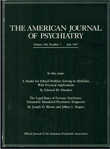Consequences of Involuntary Treatment
TO THE EDITOR: The study reported by John A. Kasper, M.D., and colleagues in the April 1997 issue of the Journal (1) does not adequately address the consequences of involuntary treatment (and hospitalization) for patients. To do this, a study would have to follow patients for a substantial period after discharge to see how they fare in terms of functioning, rehospitalization rates, and cooperation with follow-up plans. Barbara Grumet and I reported a study in 1984 (2), a period during which New York had a four-step administrative procedure for dealing with treatment refusal. We found that refusers who later agreed to be treated at some point during the administrative review stayed out of the hospital nearly twice as long as a matched group of patients who complied with medication. We speculated that “perhaps [this group of refusers] retained a healthy skepticism about doctors, medicine, and psychiatry and some sense of themselves as not without power and control over their lives. These qualities may have helped the `refusers' to better cope with life outside the hospital.” The Virginia administrative scheme, which allows clinicians to override their patients' refusal without recourse to appeal at a higher level, completely disregards the potential psychological benefit for patients in retaining some sense of personal autonomy.
1. Kasper JA, Hoge SK, Feucht-Haviar T, Cortina J, Cohen B: Prospective study of patients' refusal of antipsychotic medication under a physician discretion review procedure. Am J Psychiatry 1997; 154:483–489Link, Google Scholar
2. Hassenfeld IN, Grumet B: A study of the right to refuse treatment. Bull Am Acad Psychiatry Law 1984; 12:65–74Medline, Google Scholar



